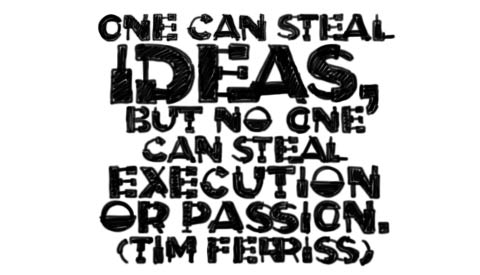Success Advice
3 Powerful Life Lessons From the Multi Millionaire “Tim Ferriss”

Tim Ferriss (if you’re not familiar with his work) is a New York Times and Wall Street Journal best selling author, an angel investor in companies such as Facebook, Twitter, Uber, and Evernote, a blogging/podcasting extraordinaire with more than 1 million monthly visitors to his site, and the first American to hold a Guinness World Record in tango.
He’s one of the only people in the world whose other accomplishments completely dwarf the fact that he’s a Princeton alumnus.
But aside from his laundry list of achievements, Tim is also the world’s leading authority on Lifestyle Design.
What exactly is that? An entirely new and rapidly growing category of blogs, businesses and books focused on challenging traditional assumptions and living a richer life.
In his debut novel, The 4-Hour Workweek, Ferriss begs the question: Why should you have to wait until you’ve worked 40+ years and you’re 65 years-old to start traveling, spending quality time with friends and family, and taking up new hobbies?
Why not live the life you want right now? Why not enjoy every waking moment to the fullest?
Ferris firmly believes in turning the traditional American retirement plan upside down. And rather than deferring all your happiness to the future (65+ years old), he presents the case for us to streamline our lives, build our own business, find joy, travel the world and be passionate today.
As we gear up for the New Year with resolutions and goal setting on our mind, it may be time to revisit a few of the powerful life lessons embedded in his timeless classic, The 4-Hour Workweek.
By applying Ferriss’s philosophies to our next-year’s goals, we’re certain to kick start the year off right and catapult ourselves to greater levels of success.
So let’s dive right in and begin designing the lives we want, TODAY, using these potent principles.
1. 80/20 your way to success
Otherwise known as Pareto’s Law, the 80/20 rule says that 80 percent of the results for any given activity come from just 20 percent of the inputs. This is the foundation for many of Ferriss’ guiding tenants. One example of the rule in action for entrepreneurs is 80 percent of your business’s revenue typically comes from just 20 percent of your client/customer base.
Ferriss argues that you should eliminate the 80 percent of things you’re doing that aren’t yielding significant results. And instead you should focus exclusively on the 20 percent of activities that are. In doing so, you free up A TON of your time to focus on duplicating those actions/clients/processes that yield high returns. The 80/20 rule works in the opposite way as well.
Normally, you’ll see that 80 percent of your problems in business or in life come from just 20 percent of the people and clients you interact with.
Remove the 20 percent, and the majority of your problems disappear. Especially as we gear up for the New Year and new goals this principle can be very powerful in terms of showing us the best areas to focus on for maximum results.
However, 80/20 isn’t set in stone; it’s simply a starting point for your analysis. Sometimes you’ll find the ratio to be even higher at 90/10 or even 99/1. Whatever the case, you can channel your energy and stop wasting time on fruitless goals with this in your arsenal.

2. Never underestimate the impact of time and mobility on your happiness
A lot people (especially us entrepreneurial types) like to think that money alone will make us happier. Even if we intellectually know that money by itself doesn’t lead to happiness, we still have a tendency—year after year—to make higher income one of our top goals.
This can be very powerful and beneficial, IF done the right way. But for most of us, we just arbitrarily pick an income goal that’s higher than the last year. Instead, we should be picking an income or revenue goal that allows to do the things we want with our lives.
What does that mean? Here’s an example: Let’s say we run an online merchandising business that typically profits $100,000 per year. At that level, let’s say the owner spends 30 hours per week on the business and has time to take three, 2-week vacations throughout the year. The business stays running and automated just fine. However, what most people would do in this situation is raise the goal above $100,000 in profit to $200,000 in profit. Now, instead of 30 hours per week, let’s say the owner spends 80 hours per week on the business (more time acquiring new clients, dealing with customers, and processing orders) and has ZERO time for a vacation.
Which life would you prefer? If we truly look at it, the person making $200K is poorer in terms of time and mobility than the person making $100K. Now am I saying you shouldn’t be ambitious and raise your goals? Absolutely not! But what you MUST always do is consider WHY you want the goals your setting. If your income is going to provide a certain lifestyle for you, but achieving that level of income doesn’t allow you ANY free time, should you really have that goal? We must always remember that being in control of our own time and destiny is essential to long-term happiness, and understanding this is crucial for setting your next year’s goals.

3. Always push yourself outside your comfort zone.
Throughout the 4-Hour Workweek, Ferriss lists Comfort Challenges at the end of nearly every chapter.
These challenges range from walking up and getting a guy or girl’s phone number to testing your skills in negotiation at flea markets.
Why did Tim choose to scatter these throughout his book? He summarizes the answer in this quote:
“Success can be measured by the number of uncomfortable conversations you’re willing to have.”
Essentially, he’s saying get outside your comfort zone and keep pushing yourself. That’s how 26 out of 27 publishers turned down Ferriss’ idea before he finally got his book published—he kept pushing past doubt and his comfort zone. And when his book launched, it became an instant best seller.
Ferriss’ message for entrepreneurs is you have to get outside your comfort zones and develop socially so you can effectively present and sell your ideas and concepts. But more importantly, the key to a rich life is connecting with people and forging lasting friendships. To do that you have to know how to talk to anyone, with confidence and be persuasive. If your 2015 goals don’t include an element of that, you should revisit and refine them until they do.
Crush it in 2015! And if you haven’t already pick up a copy of The 4-Hour Workweek or any other of Tim Ferriss’ masterpieces.
A Day In The Life of Tim Ferriss
Business
If Your Business Internet Keeps Letting You Down, Read This
From smoother operations to better security, dedicated internet access is quietly powering today’s high-performing businesses.

Today, a dependable internet service is the bedrock for uninterrupted business operations. Many organizations rely on stable online connections for communication, data transfer, and customer interaction. (more…)
Did You Know
How Skilled Migrants Are Building Successful Careers After Moving Countries
Behind every successful skilled migrant career is a mix of resilience, strategy, and navigating systems built for locals.

Moving to a new country for work is exciting, but it can also be unnerving. Skilled migrants leave behind familiar systems, networks, and support to pursue better job opportunities and a better future for their families. (more…)
Life
10 Research-Backed Steps to Create Real Change This New Year
This New Year could finally be the one where you break old patterns and create real, lasting change.

Every New Year, we make plans and set goals, but often repeat old patterns. (more…)
Change Your Mindset
The Silent Skill That Makes People Respect You Instantly
What truly earns respect and why most people go about it the wrong way

Everybody craves respect but not everyone earns it. Some people believe that a title, years of experience, or a position of authority automatically entitles them to respect. (more…)
-

 Health & Fitness1 week ago
Health & Fitness1 week agoWhat Minimalism Actually Means for Your Wellness Choices
-

 Did You Know1 week ago
Did You Know1 week agoWhy Most Online Courses Fail and How to Fix Them
-

 Business1 week ago
Business1 week agoIf Your Business Internet Keeps Letting You Down, Read This
-

 News5 days ago
News5 days agoBrandon Willington Builds 7-Figure Business by Ignoring Almost Everything


























4 Comments